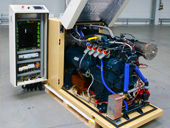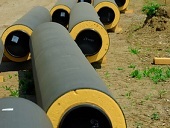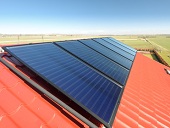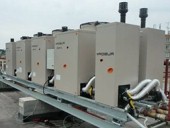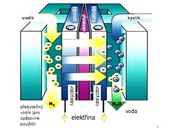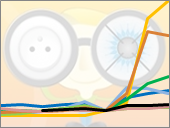The paper deals with identifying suitable areas of use of small cogeneration units fossil fuels and renewable energy sources in municipal and industrial uses. Discusses the advantages and disadvantages of cogeneration units based on internal combustion engines, gas turbines and steam engines, including their position in the electricity grid
Archiv článků od 19.10.2009 do 26.9.2011
The paper discusses the alternative heat sources to central district heating for panel buildings. Nowadays, most of the reconstructions of panel buildings cover only the improvement of thermal quality of the building envelope in order to decrease the heat loss and the operating costs of heating. With high-quality insulated envelope it is possible to achieve high reduction of thermal heat loss. Additional reduction of heat loss on the envelope insulation side is very expensive. In order to reach another reduction of operational costs in the building it could be more efficient to change the heat source with cheaper energy.
There has been a lot of talk lately about disconnecting from the central heating supply. And not only that, some housing cooperatives and unit owners have already taken this step, or are planning to do so. Are those who have disconnected from the central heating supply, and have their own boilers, satisfied and have they saved money?
A revised version of the directive was issued in 2010 under the title 2010/31/EU. In part, it is a modification of the original. In it, there are have been defined new administrative tools to increase the energy performance of buildings - among others, it includes the concept of "building with almost 0 energy consumption".
Due to rising energy prices heating systems face a number of disadvantages associated with the use of central heating supplies to heat residential and non-residential spaces. This is a strong trend in condominium owned residential buildings in the care of SVJ, in rental housing it is almost non existent and it is contradictory in cooperative housing, which is a modification or rental housing.
CPP is on the brim of a big transformation. For more than 1,5 million flats, council heating means the most comfortable, and we still believe the most ecological, heating method. That is because the centralisation of heating allows the deployment of advanced technology that is more efficient, environmentally friendly and economical. This article offers a brief explanation on how to economically optimise the processes and systems to facilitate the transformation of CPP systems.
Currently in the Czech Republic we observe relatively large development of energy efficiency projects including energy production from RES, in particular electricity. This development is interconnected with the current legislative framework for such support in the Czech Republic and related support mechanism in the form of investment and operating subsidies for electricity production from RES. Current status of implementation of these projects is particularly affected by our membership in the EU and the subsequent implementation of the EU respective directives into national legislation. Furthermore, the Czech Republic has achieved a significant success in international emissions trading (IET International Emission Trading) by selling its surplus CO2 emissions under the Kyoto Protocol. In comparison with other EU countries the Czech Republic belongs to the frontrunners in terms of implementation of energy efficiency projects, mainly in the context of recent strong development of photovoltaic power installations. The article presents a basic overview of Operational Programmes financed by SCF EU, under which energy saving and RES projects in the private and public sector are supported, the Green Savings programme, designed for household sector and financed by selling CO2 emission surplus, and the system of feed in tariffs for RES electricity production. Based on currently available ex-ante evaluation of the supported projects the article quantifies the anticipated benefits of these projects in terms of savings in the final energy consumption and in terms of increase in energy production from RES.
This contribution summarizes utilizing of co-generation and tri-generation systems for effective electricity, heat and cool production. A co-generation and a tri-generation offer more effective utilizing of primary energy sources in comparison with separate production of different kinds of energy. This contribution describes actual state in the Czech Republic in year 2009.
The purchase price of electricity from photovoltaic power plants in the Czech Republic are the highest within the whole of the European Union. Does this mean that support of them in the Czech Republic is also the highest? When compared with similar climate conditions the conclusion is that such interpretation is erroneous.
More than 15 years TZB-info is focused to perspective equipment for building services with priority in heating. During this period the main question: "how to heat" shifted to question: "how to reduce heat loses". For example France is planning for new buildings only passive standard, and begining 2050 only so-called quasi-zero buildings. In Czech Republic one of significant impulses is subsidy program Zelená úsporám (Green for savings). Technical solutions are widely known in professional community, unfortunately high investment cost and long payback time are the main barriers for broader expansion of the solutions. Folowing article is the first from a serie focused to long time planing of reduction of energy consumption in the Czech Republic. From two ways - to prospect new energy sources or to reduce energy consumption - the second needs no to destroy another villages or towns.
How can heating for Czech homes be assured while at the same time get rid of the dependence on dirty coal and Russian gas? This is answered by the scholarly study by the DUHA movement – Clean Heating. The solution is based on a combination of investments on home insulation, solar collectors and biomass heating plants. Very important are the new standards for developers and provisional supply of coal from the Bílina mine. The calculations are based on those from the Pačes Commission. There are many opportunities. Increasing the energy efficiency of builings – i.e. insultaions – and the heating potential from renewable sources represent more than 300 million gigajoule. This surpasses the total current heating consumption of Czech homes. The possibilities of insulating Czech homes are also five and a half times higher than the controversial expansion of the coal mines around Most, which is linked with a further devastation of the North Bohemian landscape and the demolition of towns.
The costs for the support of energy from renewable sources is one of the regulated items in the prices of electricity. The costs for the distribution of electricity are also among the regulated items. The price of the electricity itself is not regulated and is determined by the trade at the power exchange market based on supply and demand.
In the 1970's the interest in renewable energy sources increased considerably due to the energy crisis. At that time, the fist extensive and reputable studies were published, which talked seriously about the fact that conventional energy sources are exhaustible. The Czech republic adopted its first energy policy in 1992 in agreement with the regional environmental limits of coal.
Energy Regulatory Office (ERÚ) announced „adequate“ feed-in-tarif (FiT) for photovoltaic electricity. Based on actual situation on Czech PV market it is recommended to reduce FiT for systems below 30 kWp to 11 200 CZK/Wp and for systems above 30 kWp to 9 000 CZK/Wp (actual exchange rate is 25,785 CZK/EUR, see this site).
The recommended values of FiT correspond with actual situation on Czech PV market. Unfortunately exchange rate of Czech koruna (CZK) to Euro is instable. Exchange rate of Czech koruna to Euro oscillate in wide range from about 28 in beginning of 2008 to about 23 in August 2008 and back to about 29 in February 2009. In case the exchange rate will be on upper level the growth of photovoltaic installations will cease. On lower level FiT will be very profitable again.
On other hand future prices of PV modules are unpredictable. Actual rapid fall of prices is mostly based on decrease of price of Silicon as raw material. If the price of Silicon will rise after financial crisis will end, the prices of PV modules will rise too. The prices of modules will probably never exceed last year level, however prices high above 2 €/Wp are possible. According to those uncertainties the FiT could become either excessively profitable or purely restrictive.
zpět na aktuální články
